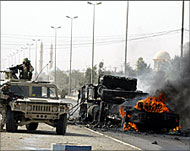Bremer upbeat over Iraq funds
US administrator of Iraq, Paul Bremer, is optimistic that billions of dollars will be raised for the war-torn and now occupied country, at the international donors’ conference in Madrid.

Speaking on the eve of his departure for Spain, Bremer said he thought a number of countries will make important contributions to benefit Iraq’s shattered infrastructure.
“We’re finding a lot of receptivity. This is my impression. We had three Iraqi delegations travelling around the world: one in Europe, one in the region and one in Asia, and they all came back rather enthusiastic.
Bremer added that “I think we’ll find the international financial institutions will come forward, with pretty good contributions. The Japanese are already at $1.5 billion”, he said.
France criticised
Bremer turned his attention particularly to France, which strongly opposed the war and has since, together with Germany and Russia, given a cold shoulder to the Madrid conference and its ambition of raising up to 36 billion dollars for Iraq’s basic services, ranging from electricity to schools and hospitals.
|
“There is a role for France and other great countries to play here” Paul Bremer, US administrator of Iraq |
“I think it would be a sad thing if the French government could not find a way to participate in the reconstruction,” said Bremer.
“I think it’s time for them to get beyond all of these discussions that took place back in February and March. It’s time for them to recognise that we’re going to reconstruct Iraq. There is a role for France and other great countries to play here.”
US aid
Bremer also said the battle was not finished to convince the US Congress to pass its $20.3 billion Iraqi civilian reconstruction package as a full grant instead of demanding half of it eventually be paid back.
“I think we’re going to make a big effort to make it grants,” Bremer said.
 |
|
Bremer says there is a role for |
Bremer said once the US package received final approval, it would still take till next March before the money started to make a difference in Iraq.
“I would think by the end of the first quarter of 2004 we should begin to see activity based on the spending. Some projects will go more quickly than others. The main thrust of that money will take a few months to arrive and have an impact,” he said.
Conference crucial
Bremer hammered home the dire state of Iraq’s essential services that have made the Madrid conference crucial to the country’s drive to build a better future after years under the rule of Saddam Hussein.
“I think the most difficult thing for us has been to try to quickly repair this devastated infrastructure in this country,” Bremer said.
|
“I was not prepared for the amount of damage that had been done…” |
“I was not prepared for the amount of damage that had been done – not by the war in fact I was surprised by how little damage had been done by the war – but by how much damage has been done over the last 35 years to the power system, the water system, the oil fields, the textile factories, the cement factories. I just don’t where all the money he (Saddam) had went.”
The two-day Madrid conference, which starts on Thursday and is expected to draw 58 countries and 19 international organisations, aims to help meet the $36 billion sum for 2004-2007 proposed in a UN-World Bank report.
So far, Japan has pledged $1.5 billion for next year, but the US requests for aid have been met with an icy response from France, Germany and Russia.